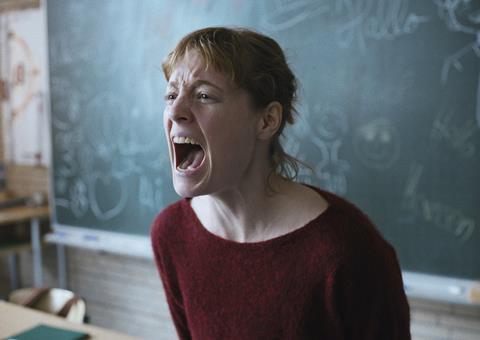Leonie Benesch impresses as a teacher struggling to keep control in this school-set German drama

Dir: Ilker Catak. Germany. 2023. 94mins
Standing at the front of her classroom, secondary school teacher Carla Nowak (Leonie Benesch) seems utterly at home in her environment. She keeps a tight reign on her rabble of 12- to 14-year-olds, relishes her part in the shaping of these young minds. But when she accuses a colleague of theft, it sparks a series of events which quickly unsettle not just her but the entire school. This fourth feature from German director Ilker Catak is a keenly observed and richly detailed study of the seismic repercussions that can come from the seemingly smallest of decisions, and how an era of social media and fake news is redefining human interaction.
Benesch’s controlled performance suggests much more than is ever said
Based on real-life experiences of Catak and co-writer Johannes Duncker, who went to the same school in Istanbul (Catak was born in Germany and lived there until he was in his early teens), The Teachers’ Lounge has a deep-rooted authenticity and attention to detail that will surely win plaudits following its premiere in Berlin’s Panorama. While it is entirely set in one location, the universality of the drama should see it appeal beyond a domestic audience (the film opens in Germany in May, through Alamode). Positive reviews should certainly buoy its journey.
In the hubbub of the teacher’s lounge, Carla is flustered as she fields multiple requests and frantically writes a note on her hand. Next, at a meeting in which two students are being questioned about their knowledge of a recent spate of thefts, she is uncomfortable with their interrogation. (This questioning is carefully framed as voluntary, the headmistress’s assertion that “if you have nothing to hide, you have nothing to fear” being a key theme throughout). Here, Marvin Miller’s expertly-deployed score brings in the frantic staccato of plucked strings; the first appearance of an effective motif that brings an ominous note whenever Carla is feeling the pressure.
When Carla finally reaches the sanctuary of her classroom the clamour of the kids is accompanied by the sounds of an orchestra warming up, falling to silence when they rise to stand on her silent command. Carla is a conductor, finely attuned to the rhythms of the children, taking pleasure in the harmonious black-and-white nature of the maths problems on the board. As seen in Benesch’s controlled performance, which suggests much more than is ever said, this is a woman used to acting with thought and precision, responding to the facts at hand rather acting on impulse.
And so, she makes sure that she has proof — the capturing of an arm wearing a distinct blouse at the edge of a webcam video — before she accuses school receptionist Mrs Kuhn (an excellent Eva Lobau) of stealing money from her wallet. Mrs Kuhn, however, fervently denies the charge, and an investigation ensues; one that will change both how Carla is treated by both students and colleagues, and will have a direct impact on Mrs Kuhn’s son, and Carla’s favourite student, Oskar (Leo Stettnisch, a standout amongst an impressive young cast). Through the steady unravelling of this story, the film uses the school as something of a microcosm of modern society, with its power plays, shifting loyalties and the never-ending search for truth.
We never discover anything about the lives of the characters beyond these walls, and we don’t need to — they are clearly defined and compelling within this singular, vivid environment. Catak uses a muted colour palette with pops of colour — like the cheerful scarf Carla wears, and then discards, after a confrontational parents evening in which the adults in the room are armed with knowledge thanks to their omnipotent WhatsApp group. And as Judith Kaufman’s immersive camera prowls the halls, weaving in and out of conversations, you can almost smell the blackboard chalk.
But if elements of these school days are familiar, the film takes a distinctly modern view in its look at its shifting dynamics. These children know their rights, are increasingly unafraid to challenge authority and injustice where they see it. The student journalists of the school newspaper determinedly print (what they see as) the truth — “everything else is just PR”. Finding herself caught between multiple rocks and hard places, Carla keeps a tight hold of her idealism even as she becomes increasingly isolated (something she is already rather used to, given her Polish heritage.) She keeps doggedly focused on the search for truth; whether or not she will find it, let alone be rewarded for trying, is something the film leaves deliberately unanswered.
Production companies: if… Productions
International sale: be for films info@beforefilms.com
Producer: Ingo Fliess
Screenplay: Ilker Catak, Johannes Duncker
Cinematography: Judith Kaufman
Production design: Zazie Knepper
Editing; Gesa Jäger
Music: Marvin Miller
Main cast: Leonie Benesch, Leo Stettnisch, Eva Lobau
















![[L-R]: Amanda Villavieja, Laia Casanovas, Yasmina Praderas](https://d1nslcd7m2225b.cloudfront.net/Pictures/274x183/6/4/1/1471641_pxl_20251224_103354743_618426_crop.jpg)







